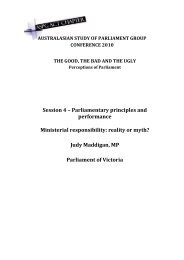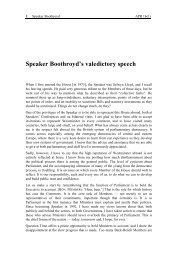Parliament's Watchdogs â New Zealand 's Officers of Parliament
Parliament's Watchdogs â New Zealand 's Officers of Parliament
Parliament's Watchdogs â New Zealand 's Officers of Parliament
You also want an ePaper? Increase the reach of your titles
YUMPU automatically turns print PDFs into web optimized ePapers that Google loves.
Spring 2010 <strong>Parliament</strong>’s <strong>Watchdogs</strong> — NZ’s <strong>Officers</strong> <strong>of</strong> <strong>Parliament</strong> 139Authority to be made <strong>of</strong>ficers <strong>of</strong> <strong>Parliament</strong>. Similar agencies, however, have beencreated <strong>of</strong>ficers <strong>of</strong> <strong>Parliament</strong> in other jurisdictions.In the United Kingdom, the Nolan reforms 17 established a number <strong>of</strong> ethicalregulatory bodies with varying relationships with <strong>Parliament</strong>. In Scotland, sevenparliamentary <strong>of</strong>ficials have been established, including a commissioner forchildren and young people. 18 In Canada, there are no agreed criteria for an <strong>of</strong>fice <strong>of</strong><strong>Parliament</strong>. Agencies such as the Public Service Commission and the CanadianHuman Rights Commission 19 have been established ad hoc; the main criterion formaking the <strong>of</strong>fice holders <strong>of</strong> these agencies <strong>of</strong>ficers <strong>of</strong> <strong>Parliament</strong> was theirperceived independence from executive government. The classification issue hasnot been so prominent in Australia, where the Ombudsman and the Auditor-Generalare the only <strong>of</strong>ficers <strong>of</strong> the Commonwealth <strong>Parliament</strong>. 20 However, the issue hasarisen at the Australian State <strong>Parliament</strong> level — in 2006 it was the subject <strong>of</strong> areport <strong>of</strong> the Public Accounts and Estimates Committee <strong>of</strong> the <strong>Parliament</strong> <strong>of</strong>Victoria, which recommended a framework and set <strong>of</strong> criteria similar to those usedin <strong>New</strong> <strong>Zealand</strong>.One way to consider this issue is perhaps from a parliamentary perspective,focusing first on the factors that would persuade a <strong>Parliament</strong> to entrust aninstitution to carry out fairly coercive functions on its behalf. Then, the needs<strong>of</strong> the <strong>of</strong>fice holders might be considered, particularly what statutory measuresmight be necessary to preserve their independence and prevent interference by theexecutive.Buchanan argues that it is too simplistic to confer <strong>of</strong>ficer <strong>of</strong> <strong>Parliament</strong> status on anagency purely to secure independence from the executive for an agency thatscrutinises the executive or holds it to account. 21 One <strong>of</strong> the functions <strong>of</strong> a<strong>Parliament</strong> is to scrutinise and control the Government, 22 and it is easy to concludethat any instrument <strong>of</strong> Government that seems to undertake a parliamentary-typerole should sit within the parliamentary realm. This, however, is to ignore the role<strong>of</strong> the judiciary, and the practices that have emerged to allow certain <strong>of</strong>fice-holdersand agencies to operate independently within the executive branch <strong>of</strong> Governmentdespite their functions appearing to run counter to the interests <strong>of</strong> the Government— for example, <strong>New</strong> <strong>Zealand</strong>’s Children’s Commissioner, Commerce Commission,and the Independent Police Complaints Authority. Conventions and politicaldisincentives surround the operation <strong>of</strong> such agencies; for example, the Governmentmust consult other political parties about the appointment <strong>of</strong> some <strong>of</strong> these <strong>of</strong>ficers.Perhaps, as Buchanan suggests, these conventions should be strengthened beforejurisdictions such as the United Kingdom look to the <strong>of</strong>ficer <strong>of</strong> <strong>Parliament</strong> model toallow an agency to be part <strong>of</strong> executive government while operating independentlyfrom the Crown.Statute also provides a means <strong>of</strong> protecting the independence <strong>of</strong> such agencies. <strong>New</strong><strong>Zealand</strong>’s Crown Entities Act 2004 now provides for the appointment, governanceand accountability <strong>of</strong> Crown entities and for the categorisation <strong>of</strong> Crown entities
















